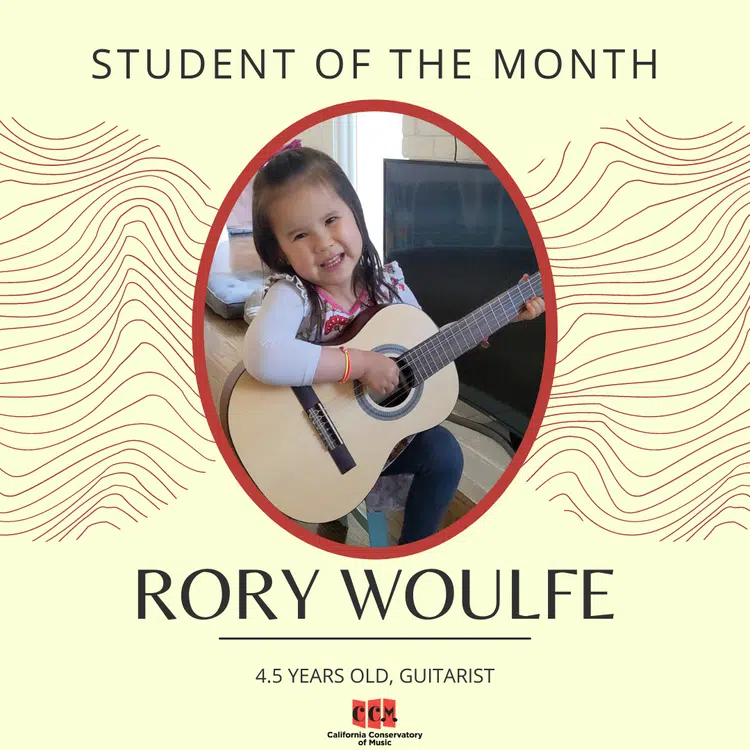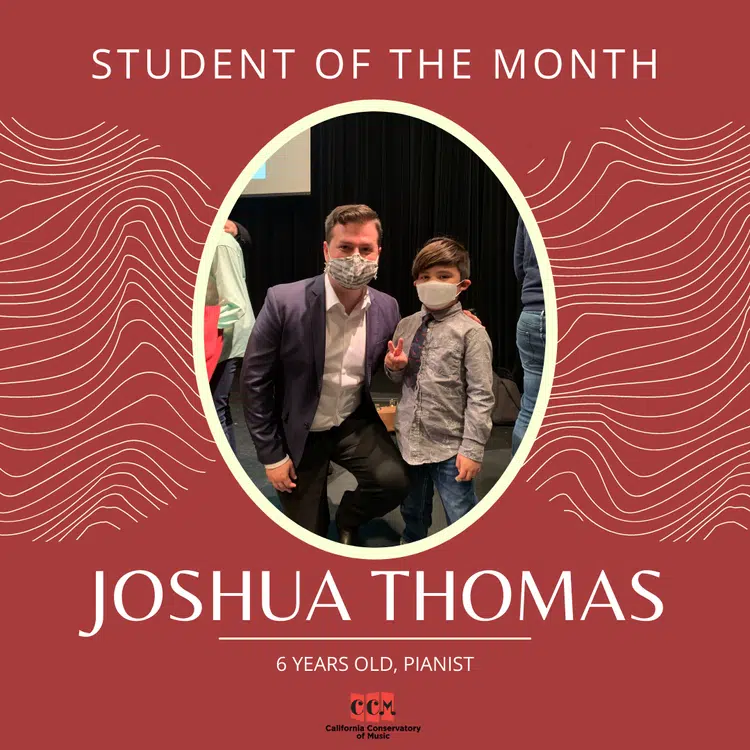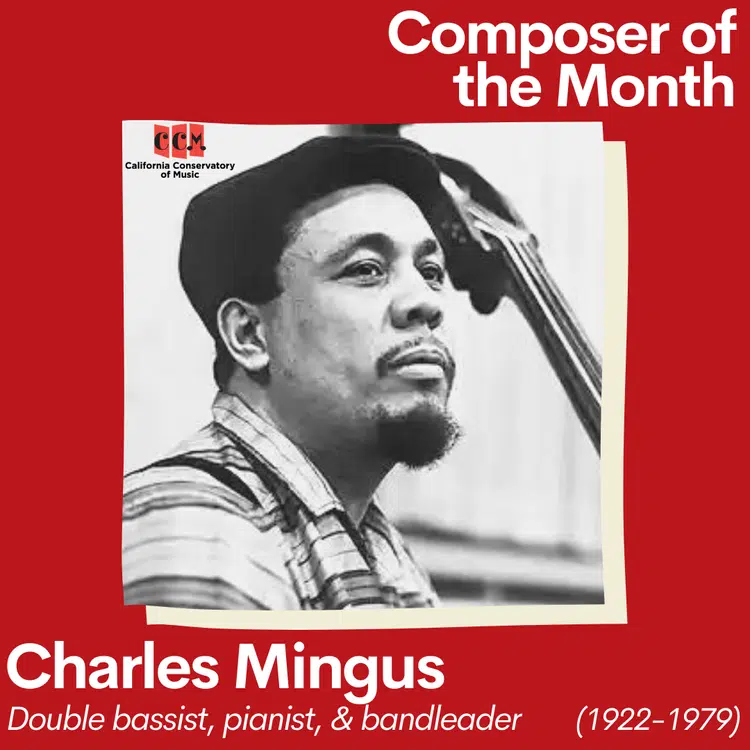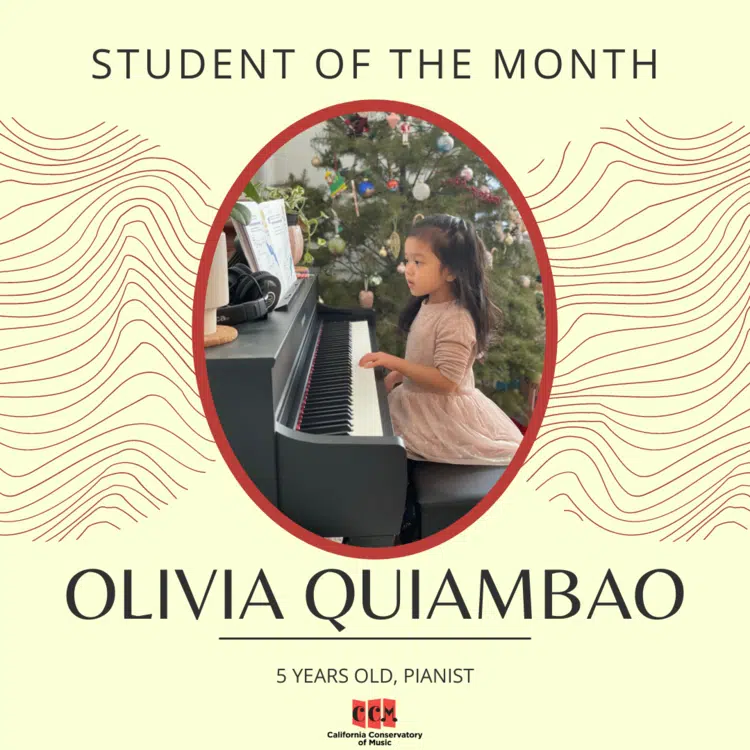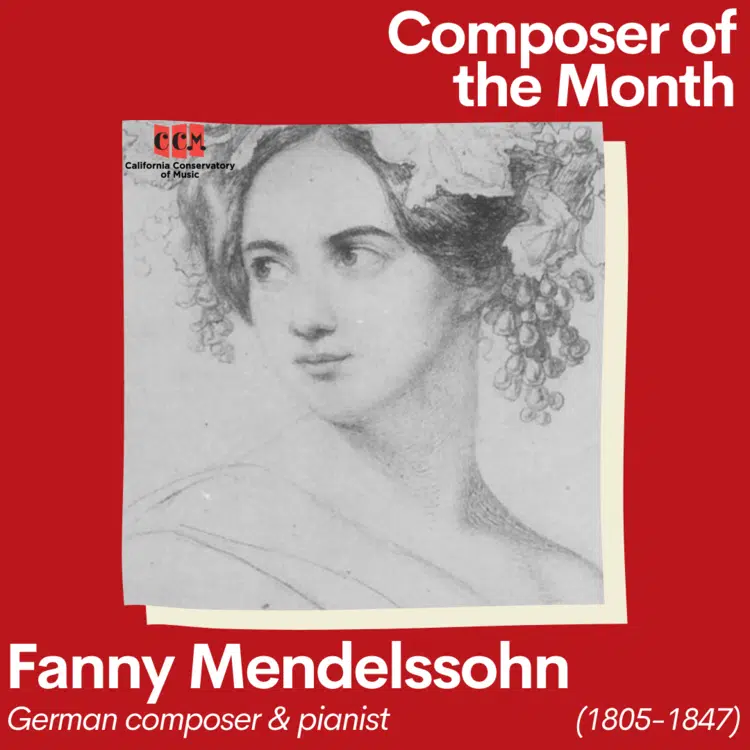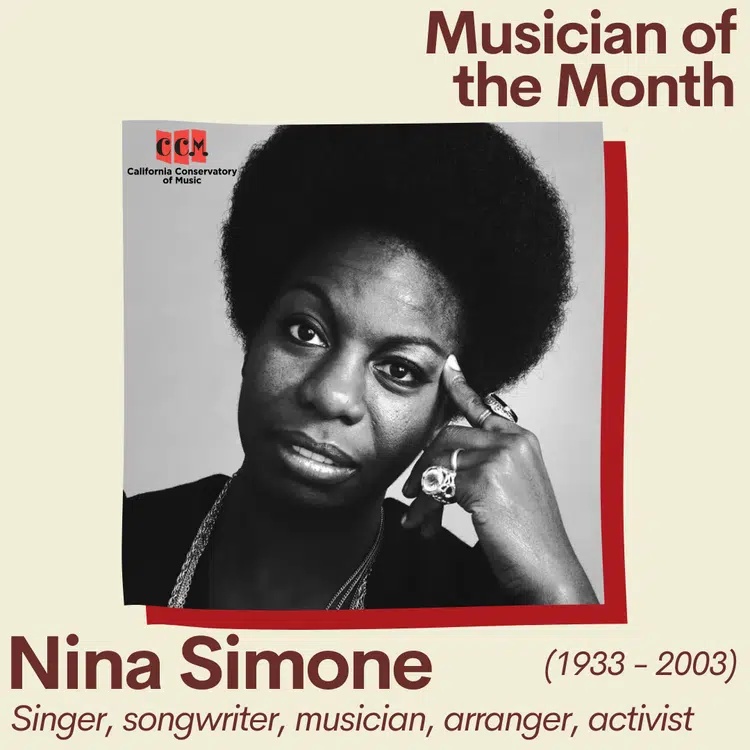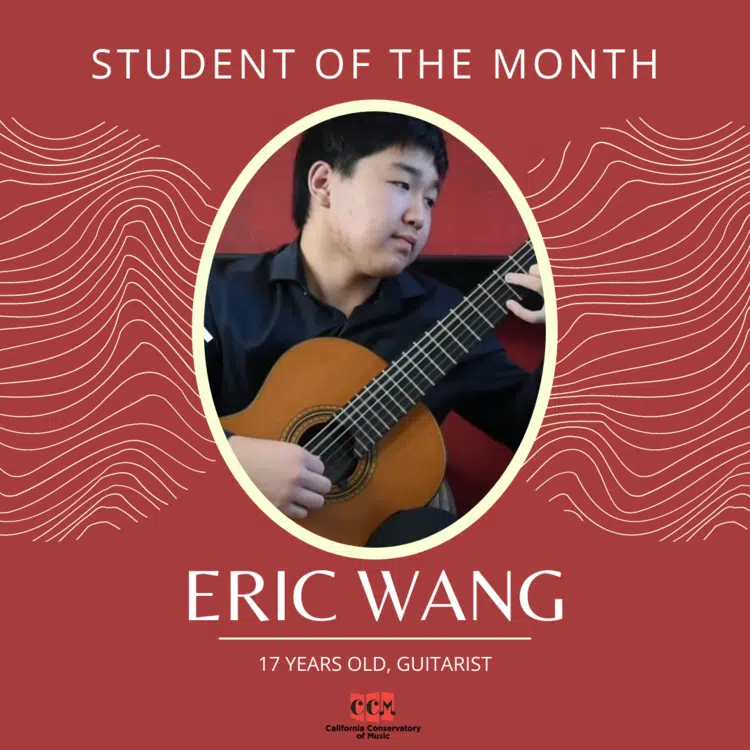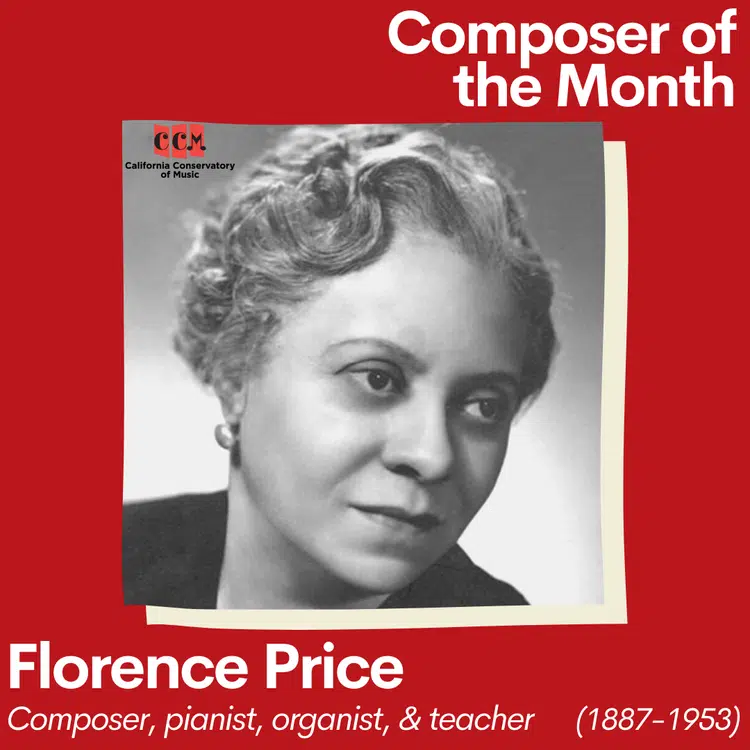This month, we’re delighted to feature CCM guitar student, Rory Woulfe, as our May 2022 Student of the Month! Rory has been taking guitar lessons for around 4 months at CCM’s Redwood City location with Teacher Sebastian O. She just completed her 50-day challenge and teacher Sebastian says she is always very enthusiastic and excited to learn!
Read below to see Rory’s advice for CCM students just starting on their musical journey, and don’t forget to check out the parent spotlight as well.
Q: What is your name?
A: Rory Woulfe
Q: How old are you?
A: Four and a half years old
Q: Who is your teacher?
A: Teacher Sebastian O
Q: What advice would you give to a guitar student just starting out at CCM?
A: Focus and try your best!
Q: What piece are you looking forward to learning someday?
A: Let it Go
Q: What is your favorite thing about playing guitar?
A: Being able to play an entire song (Twinkle Twinkle)
Q: What is your favorite food?
A: Quesadillas
Q: Do you have a pet?
A: Yes, two dogs, Milo and Macy
Q: Do you play any sports or do any other activities outside of music lessons?
A: Swimming, dance, and gymnastics
Q: What do you want to be when you grow up?
A: Dancer, singer, engineer
Q: What is your most memorable experience at CCM?
A: Learning to put the squishy part of my arm on the edge of the guitar
……………………………………………………………………………………………………………………
Parent Spotlight – Leslie Liang
Q: Regarding guitar, what are you most proud of your child accomplishing?
A: Guitar is the one thing that Rory willingly does every single day. The CCM daily practice reward system is really effective (as is Teacher Sebastian!), but I am also proud that Rory takes pride in her constant improvement.
Q: What advice would you give to a new parent starting in the program?
A: If your child is starting out young, meet them where they are with how they are processing and learning. For us, that has meant lots of mnemonics, animal analogies, and gamification of practice time. I also bought myself a guitar so that we could make learning guitar a parent-and-me experience, which has been helpful with focus and motivation.
Q: Why did you decide to give your child a musical upbringing?
A: I grew up playing the violin and piano, and it provided such a great community for me, as well as a foundation for an appreciation of the arts and culture. I hope for Rory to have that too, and to be able to use music as a universal language to connect with others throughout her life.
This month we’re so excited to feature CCM piano student, Joshua Thomas, as our April 2022 Student of the Month! Joshua has been taking piano lessons for around 10 months at CCM’s Sunnyvale location with Teacher Brennan. As of now, he is the only student of teacher Brennan’s to have completed the 100-day practice challenge!
Read below to see Joshua’s advice for CCM students just starting on their musical journey, and don’t forget to check out the parent spotlight as well.
Q: What is your name?
A: Joshua Thomas
Q: How old are you?
A: 6 years old.
Q: Who is your teacher?
A: Teacher Brennan.
Q: What advice would you give to a piano student just starting out at CCM?
A: Just to keep trying and keep practicing, even when it’s hard. It gets easier.
Q: What piece are you looking forward to learning someday?
A: Pieces from the movie La La land
Q: What is your favorite thing about playing piano?
A: I like learning new songs and then getting good at them so it becomes really fun to play and sing.
Q: What is your favorite food?
A: XLB dumplings and burgers
Q: Do you have a pet?
A: No, but I really want a dog. My parents said they might let me get a goldfish this year at least.
Q: Do you play any sports or do any other activities outside of music lessons?
A: Swimming, soccer, basketball, snowboarding, and playing Pokémon and chess.
Q: What do you want to be when you grow up?
A: I want to be a chef when I grow up.
Q: What is your most memorable experience at CCM?
A: Getting the 100-day practice trophy. I’m working towards getting the 1-year practice trophy.
……………………………………………………………………………………………………………………
Parent Spotlight – Marjorie Chen
Q: Regarding piano, what are you most proud of your child accomplishing?
A: I’m most proud of Joshua sticking with learning piano, even when it was frustrating in the beginning. He was able to get over the initial hump, started practicing everyday, and now really enjoys playing piano. I love that he enjoys playing piano, and it’s not a chore to get him to practice. It’s also really rewarding to see how happy he gets whenever he masters a new piece. This has helped him build resiliency.
Q: What advice would you give to a new parent starting in the program?
A: Build the habit of practicing everyday, even if it’s just a few minutes on busy days. We saw a huge improvement when Joshua started playing a little everyday as part of his daily routine, versus having longer but less frequent practice sessions. CCM’s daily practice challenge with the milestone awards really motivated my son.
Q: Why did you decide to give your child a musical upbringing?
A: I grew up playing piano and the flute, and I love music. I really valued having a musical background, especially when I got older. I wanted to pass this on to my son, and it’s been great to see his love of music grow!
California Conservatory of Music is continuing to celebrate Composer of the Month and honoring Jazz Appreciation Month by remembering Charles Mingus, a composer, double bassist, and jazz pianist.
Charles Mingus’s Personal Life
Charles Mingus was born on April 22, 1922, in Nogales, Arizona. However, he was raised largely in Los Angeles, California. His mother’s paternal heritage was Chinese and historical records show that his dad was the offspring of a mulatto farmhand and his employer’s granddaughter.
Defined by many as irascible, demanding, and probably a genius, Mingus chose a uniquely iconoclastic path for himself through jazz in the middle of the twentieth century.
He created a legacy that was universally lauded. Mingus’s mother allowed only church-related music in the home; however, he developed an early passion and love for jazz, particularly Ellington’s music. Specifically, Mingus studied trombone and cello.
Life as a Composer
Charles Mingus was a famous American jazz double bassist, composer, pianist, and bandleader. He was a chief proponent of collective improvisation and is considered to be one of the greatest and most influential jazz musicians and music composers in history.
Charles Mingus gained a reputation as a bass prodigy. He even toured with the famous Louis Armstrong in 1943 and played with Lionel Hampton’s band.
His career spanned over three decades and includes collaborations with many other jazz legends, like Duke Ellington, Dizzy Gillespie, Charlie Parker, Dannie Richmond, and Herbie Hancock. You should know that Mingus was briefly an important member of Ellington’s band in the 1950s.
Note that Mingus’s music compositions continue to be played by many contemporary musicians and artists ranging from several repertory bands such as Mingus Dynasty, Mingus Big Band, and Mingus Orchestra to inspiring high school students who like playing the charts and competing in the famous Charles Mingus High School Competition.
In 1942, Mingus played bass with Barney Bigard’s famous ensemble, which also featured trombonist Kid Ory. In the subsequent year, Charles began studying symphonic form and technique formally with Herman Rheinschagen. Mingus toured with Lionel Hampton’s band starting in 1946. In 1950, he gained national attention and fame as a member of Red Norvo’s trio.
Did you know that he also founded the notable Jazz Workshop in 1955? And in 1964, he started his record company, which became popular as Charles Mingus Enterprises.
Notably, in 1993, the Library of Congress acquired Charles Mingus’s collected papers, including sound recordings, scores, correspondence, and photographs in what the Library described as one of the most important acquisitions of a manuscript collection relating to jazz music in its history. This is why students taking music lessons at the California Conservatory of Music are inspired by his work.
EPITAPH
Many consider Epitaph as the masterwork of Charles Mingus. Did you know that it’s a composition that is over 4,000 measures long and requires 2 hours to perform? It was completely discovered during an important cataloging process following his death by renowned musicologist Andrew Homzy.
And with the assistance of a financial grant from the Ford Foundation, the instrumental parts and score were copied. Note that the piece was premiered by a huge 30-piece orchestra, professionally conducted by Gunther Schuller. If you are considering taking piano or violin lessons, you should be familiar with his work.
Notable Facts
- A popular and excellent trio of Mingus, Tal Farlow, and Red Norvo in 1950 and 1951 received considerable critical acclaim.
- In 1972, Mingus’s autobiography Beneath the Underdog was published.
Since his death, Mingus’s fame and importance increased remarkably, thanks mainly to the determined efforts of his widow, Sue Mingus. Also, a posthumous group, Mingus Dynasty, was formed immediately following his death. The concept was expanded considerably in 1991 into the exciting and prolific Mingus Big Band, which has managed to resurrect many of Charles Mingus’s most challenging scores.
If you are looking for violin or piano lessons, Sunnyvale music lessons and Redwood City Music Lessons can provide developmentally appropriate music education for young children, introducing various concepts such as body movement, rhythm, and singing to preschoolers and toddlers.
Do your legs tremble every time you are in front of a crowd? Do you sweat profusely when asked to speak, sing or perform in front of people? If you can relate to any of that, it is very likely that you have stage fright.
What Is Stage Fright?
Feeling heightened nervousness when you are in front of a crowd can translate to stage fright. People with stage fright have the irrational fear of public speaking where they start questioning their self-confidence and self-worth. They find it impossible to have the limelight in front of several people at the same time. This fear can be very embarrassing for people who have a natural talent such as singing or being able to play an instrument. If they ever want to showcase their talent it is very important for these people to get over their stage fright.
However, it is not exactly as easy as it may seem. You might have to make several efforts to regain your confidence and finally be able to stand in front of an audience without having the constant urge to run away.
How can You Get Over Your Stage Fright?
If you have let this fear rule your life, it is about time that you address it and take hold of your life back. Here are some amazing tips that if used can help you get over your stage fright easily. Without further ado, let’s get right on it.
FOCUS ON YOUR AUDIENCE
When you are delivering your performance, it is a wise idea to direct all your attention towards your audience. Instead of focusing on yourself alone, you need to realize why you are standing here in front of the stage. Your biggest concern and motivation has to be your audience as they came here to see you in all your glory.
THINK OF CALMING THINGS AND SCENARIOS
There might be several thoughts running in your mind, it is best if you overcome them by thinking of things that are calming. For example, each time you look at the crowd you can look at them as if they are the sea. If you are singing at a concert think of the audience as waves and you will be able to calm your nerves down and perform at your best.
SUBSIDE NEGATIVE THOUGHTS
It is very important that you acknowledge that you are having negative thoughts but choose to ignore them. This has to be a conscious decision that will ensure that you have control over your thoughts and you can choose what you do with them. This helps you regain control over your thoughts and how you react to them.
PACE YOUR HEART
Each time you set foot on the stage it is possible for your heart to start beating rapidly. When this happens you need to learn to control it. The best way you can do that is by practicing different breathing techniques that might help you calm down your nerves and focus on your performance.
KEEP UP WITH YOUR HEALTH
If you are of sound health, the stage fright might not be able to impact you as much as it does on people who are not very healthy. This is why it is essential that you focus on your health and do not let your stage fright get in the way.
EXCESSIVE PRACTICE
Practice makes perfect. If you put your heart and soul into your practice it will benefit you greatly. once you know that you have all it needs to excel in your performance you wouldn’t have to worry about a thing.
CONNECT WITH YOUR AUDIENCE – MIX WITH OTHER ONE
The chemistry between your audience and you is very important. To ensure that, walk into the crowd with a smile on your face. That will help you establish a good impression on your audience. You can even hype up the crowd by dancing or gesturing them to join your fun.
KEEP A CHECK ON YOUR POSTURE
The posture you maintain throughout your performance is very important. If you are slouching through the performance your audience will pick up on your lack of confidence and that will not leave a good impact on your impression.
DON’T LET MISTAKES HARM YOUR PERFORMANCE
It is perfectly fine if you make mistakes. We all make mistakes. All you need to ensure is that you don’t let that mistake take over your performance. Let it go and focus on the rest of your performance.
This month we’re so pleased to feature CCM piano student, Olivia Quiambao, as our March 2022 Student of the Month! Olivia has been taking piano lessons for around 5 months at CCM’s Sunnyvale location with Teacher Allison. Teacher Allison is so impressed by Olivia’s progress over the last several months and we’re so excited to continue witnessing her piano growth!
Read below to see Olivia’s advice for CCM students just starting on their musical journey, and don’t forget to check out the parent spotlight as well.
Q: What is your name?
A: Olivia Quiambao.
Q: How old are you?
A: Five years old.
Q: Who is your teacher
A: Miss Allison.
Q: What advice would you give to a piano student just starting out at CCM?
A: Be patient and have fun!
Q: What piece are you looking forward to learning someday?
A: Disney songs.
Q: What is your favorite thing about playing piano?
A: Getting stickers from Miss Allison when I’ve played a song well.
Q: What is your favorite food?
A: Pizza.
Q: Do you have a pet?
A: No, but I’d like a pet Unicorn.
Q: Do you play any sports or do any other activities outside of music lessons?
A: Ballet and soccer.
Q: What do you want to be when you grow up?
A: A doctor.
Q: What is your most memorable experience at CCM?
A: When Miss Allison checks off my homework because I feel like I’m getting better and better at piano!
……………………………………………………………………………………………………………………
Parent Spotlight – Christy Quiambao
Q: Regarding piano, what are you most proud of your child accomplishing?
A: I am most proud of the way she keeps practicing when she encounters a difficult song.
Q: What advice would you give to a new parent starting in the program?
A: Keep motivating and inspiring your child so they can push through the basics that may seem boring to them. Olivia keeps on going instead of wanting to quit because she knows one day she can play the songs she wants to play and also eventually pick up violin.
Q: Why did you decide to give your child a musical upbringing?
A: I’ve learned that music really helps with brain development. Olivia has also had an interest in music, whether it be singing, dancing or making up her own song.
Everyone loves an excellent plot twist. And there’s no better plot twist than knowing that a work of scientific discovery, art, or other creation such as music, was the achievement, not of a notable man, but rather a woman. California Conservatory of Music is continuing to celebrate Composer of the Month and observing Women’s History Month by honoring Fanny Mendelssohn, a German composer and pianist.
Fanny Mendelssohn’s Personal Life
Fanny Mendelssohn, and later Fanny Hensel, was a notable German pianist and music composer. She was the sister of the famous composer, Felix Mendelssohn. It is worth noting that Fanny Mendelssohn was a talented and prolific music composer of the early 19th century who often worked in private. As she was an upper-class woman with several social responsibilities, Mendelssohn wasn’t encouraged to pursue any type of public career. She was also the grandmother of the well-known philosopher Paul Hensel.
Mendelssohn was born in Hamburg and was descended on both sides from prominent and distinguished Jewish families. Because of her social responsibilities, she hosted many concerts in her Berlin home and performed music with her friends.
After a courtship of many years, in 1829 Mendelssohn finally married Wilhelm Hensel. The next year, she had her only child, Sebastian Felix Hensel.
Life as a Composer
In her lifetime, Fanny Mendelssohn composed almost 470 pieces of music. Mendelssohn’s compositions include an excellent piano trio and many books of unique solo piano pieces as well as songs.
Did you know that her music composition studies were under Carl Friedrich Zelter? Keep in mind that Mendelssohn composed more than 200 lieders (including her amazing and famous “Swan Song”) and over 100 pieces (including fugues, bagatelles, preludes, and sonatas).
She also composed instrumental music for piano and string. Note that a number of her excellent songs were published originally under Felix’s name in his famous opus 8 and opus 9 collections.
Apart from being a significant music composer, she was also one of the greatest piano virtuosos of the nineteenth century. However, as far as many musicologists are able to document, Mendelssohn played only 3 public concerts outside of her family home. One strong piece of evidence of Mendelssohn’s piano prowess is Das Jahr, which tends to be incredibly challenging and tricky work for advanced keyboardists. This is why students taking music lessons and piano lessons at the California Conservatory of Music are inspired by her work.
Also, since the 1990s, both her life and music works have become the subject of more comprehensive and detailed research. Did you know that her Easter Sonata was incorrectly credited to her brother back in 1970 before a new analysis of various documents in 2010 corrected this error?
To this day, her compositions are an important part of Redwood City Music Lessons and Sunnyvale music lessons. Our teachers and students love talking about Mendelssohn and how she approached and perfected her compositions.
Mendelssohn’s most famous and brilliant work is a cycle of pieces that depict the various months of the year, Das Jahr (also known as “The Year”) in 1841. It was written on colored sheets of paper and thoroughly illustrated by her husband.
It is actually a musical diary of the year Mendelssohn and her family spent in Rome. Keep in mind that it’s considered one of the most influential and best of the unheralded piano suites from the nineteenth century. It has been recorded and deserves inclusion in our standard piano repertoire.
Some Notable Facts
- Mendelssohn’’s mother, Lea, knew right from the day she was born that she was fated to be an excellent pianist.
- Mendelssohn was the granddaughter of the philosopher Moses Mendelssohn.
- In early 1821, she fell in love with an artist, Wilhelm Hensel.
- When she was 40, she eventually decided to go against her brother’s wish and started publishing music under her name.
If you are looking for piano or violin lessons, Sunnyvale music lessons and Redwood City Music Lessons can provide developmentally appropriate music education for young children, introducing various concepts such as body movement, rhythm, and singing to preschoolers and toddlers.
Fanny Hensel died in Berlin in 1847 due to complications from a stroke. She suffered the stroke while rehearsing one of her brother’s famous oratorios, The First Walpurgis Night. In recent years, her music has become more well-known because of concert performances and various CDs being released on popular music labels, like Hiperion and CPO.
Is Mozart your source of inspiration? Do you want to follow his musical genius and create tunes of your own? So, what is stopping you? Oh right, an electric piano. If this is your first time, getting a piano for yourself can be quite intimidating. You might not know which one is the best or what you should look for in an electric piano before buying it. Fret not! We can help you!
Before we come to piano recommendations, let’s look at some of the features you need to keep in mind before you decide on a piano.
Piano Keys Response
It is very important for your keyboard keys to respond as soon as you press on them. Some keyboards have unweighted keys that are comparatively easier to push on rather than weighted ones. However, when playing music as a beginner you must be able to feel every move and weighted piano keys should be a good option.
Sound
The sound of a piano is of prime importance, choose a keyboard piano that produces the same sound that a traditional one does.
Size
If you are an adult looking for a keyboard, it is best that you get a full-size keyboard. On the other hand, if you are a beginner or a child, getting a smaller keyboard might be the best option for you.
Best Electric Keyboard Options for You
Casio CT-X700
If you are on a budget, this keyboard is the best one for you. In this price range, you will not find many keyboards that offer Acoustic Intelligent Expression sound engines. It is also a great bargain for beginners as it provides 195 preprogrammed rhythms and demo songs with practice exercises. You can use them to sharpen your skills.
In addition to that, you can easily record songs using its six-track recorder. This keyboard also allows you to connect with other devices and listen to the songs you want to listen to. A con of this keyboard can be the complex nature of its controls that may confuse beginner music enthusiasts.
Roland Go: KEYS
Fun and learning go hand in hand! If you want a keyboard that gives you the element of fun along with the learning, this keyboard is for you. It is a compact keyboard with a completely wireless operation, which makes it great for you to carry around as you please. It can also offer great entertainment for parties, as you can play along to songs on it and be the life of the party. The piano comes with a 30,000-note song recorder and 500 high-quality sounds that are a great bargain for the price. Reviewers go on to say that the only observable con of this piano is its temperamental performance controls.
Yamaha Genos
Are you an enthusiast with no budget limitations? Well, then there is no reason to overlook this beauty. The Yamaha Genos is mostly used by professional music producers and it provides features that cater to their requirements. Its sound quality is unmatched, however, it does not come with built-in speakers. You get luxury features with this piano including assignable knobs, vocoder functions, audio recording, and voice harmony, among others.
If you can handle the price tag, this keyboard comes highly recommended.
Rockjam RJ461AX
Rockjam is known as the brand that caters to newbies and comes with an affordable price tag. This keyboard is the best one for your little pianist. It has the best features you could ask for and does not even put a dent in your pocket.
To keep the young ones motivated, this electric piano offers voice commands to stream tunes so that they can play along to them. Moreover, you also get piano stickers and a mobile application to coordinate with. If you want to develop a passion for piano in your ward, this will help you to achieve just that.
Korg EK-50L Electronic Keyboard
The Korg EK-50L is the professional keyboard of your dreams. It has countless professional features that include a 12- track sequencer, more than 35 user registration slots, and a half pedaling support. The best part about this keyboard is its high-volume speakers. The piano also comes with a great software bundle that makes it a lot easier to use.
These keyboards are currently ruling the electric piano market. Make sure you assess your needs and make the best choice among them. There are several other pianos that you can check out, but the ones mentioned here come recommended.
A rebel with a cause, a legendary pianist and singer, and a dignified diva. Nina Simone played from her soul and used her music to fight injustices. Her resilience is commendable because she did not give up.
Even when people didn’t invite her to perform and radio stations stopped playing her songs, she still did not stop. She used her music to make an even louder noise.
That is what brave and strong women like Nina Simone do. Let’s take a look at her interesting life and career.
Background
Born Eunice Waymon in Tyron, North California in 1933. She was interested in music ever since she was a child and she started taking piano and music lessons at the age of three! That is also when she started singing in the choir of her church.
Her mother was a Methodist minister and her father was a preacher and a handyman. She practically grew up in the church. Her parents saw her gift of music early on and supported her in this.
This is because she had incredible talent as she could play anything by ear. Of course, her parents soon let her take classical music lessons with Muriel Mazzanovich. This was the time when Simone developed a love for Beethoven, Bach, Schubert, Chopin, and Brahms.
She graduated high school as valedictorian and the entire community vouched for her. They raised enough money for her so she could afford a scholarship and go to Julliard.
Life In Another Place
She attended Julliard and during that time she also provided piano lessons to make ends meet. She could not, however, and had to leave Julliard.
She then moved to Philadelphia and lived with her parents. She worked and saved money so she could go to a more affordable music program which ended up being the Curtis Institute of Music in Philadelphia. Sadly, she got rejected from there and claimed that it was racially motivated.
How Eunice Became Nina
After her rejection from the Curtis Institute she still had to make ends meet. This is when she auditioned for a bar in Atlantic City. She got the job and started mesmerizing people with her voice.
News spread like wildfire and soon enough, everyone knew there was a singer at the bar who was transforming the world of music. She had mastered the piano by then and her voice soothed every soul that came around.
She changed her name to Nina Simone so that her mother wouldn’t find out she was making a living through singing in bars.
Career, Activism, And Life
Everything turned around when she was 24 years old. The music industry recognized her talent and she got signed by Syd Nathan. She released her very first album in 1957.
During this entire time, she was recording album after album and created infinite new music. She even did covers of songs from The Beatles and Bob Dylan.
She always went against the odds and showed her talent in various ways. Her music style was bold, innovative, and a fusion of many. She also took a stance when it came to activism against the racial injustices taking place at the time.
During the 1960s, she was known as the musical voice of the Civil Rights Movement. She wrote many songs for the Black community and the injustices and discrimination against them.
As the 60s ended, Simone was tired of music and the divide in the country. She went on to live in a variety of countries and struggled with many things in life. She encountered problems with the IRS, her managers, record labels, her finances, and she was struggling with many mental health issues.
Her career took off again in the 80s and she toured from time to time. She did well for herself and performed in many places. However, it was reported that she was battling breast cancer and because of that, she passed away in 2003 in her home in France.
People like Simone may physically pass away, but they leave behind an everlasting legacy and beauty in the world that lives on forever. She was an amazing singer and musician who never let anything stop her.
REACH OUT TO US
To learn how you can begin following your musical dreams, contact the California Conservatory of Music. We provide voice lessons, piano lessons, guitar lessons, and violin lessons. Contact us now to set up your free 15-minute trial lesson!
This month we’re so excited to feature CCM guitar student, Eric Wang, as our February 2022 Student of the Month! Eric has been taking guitar lessons for around 11 years at CCM’s Sunnyvale location with Teacher Robert. Teacher Robert and the rest of us here at CCM are so proud of Eric and were so happy to see him featured on NPR’s Instagram this month! Congrats to Eric for all of his accomplishments and amazing progress over the years!
Read below to see Eric’s great advice for CCM students just starting on their musical journey, and don’t forget to check out the parent spotlight as well.
Q: What is your name?
A: My name’s Eric Wang.
Q: How old are you?
A: 17 years old.
Q: Who is your teacher?
A: I study with Robert Miller.
Q: What advice would you give to a guitar student just starting out at CCM?
A: I’d say that just starting a musical instrument is always difficult. Improvement is not easy, and you may feel discouraged by your lack of progress sometimes. However, just as long as you keep playing, you’ll definitely be rewarded.
I’d also say to always be listening: to recordings and, if possible, live music. One of the key parts about becoming better at music is to listen to the music you play. Just being exposed to classical music can help you develop a better understanding and enjoyment of playing it.
Q: What piece are you looking forward to learning someday?
A: I’m really hoping to learn the Tahhiyya Li Ossoulina, by Sergio Assad, performed by the Assad duo. I’ve listened to it so much along with Jardim Abandonado, my favorite album of theirs. It’s an electrifying and enthralling piece that I’m very much looking forward to learn.
Q: What is your favorite thing about playing guitar?
A: I’d say it’s the element of interpretation that makes guitar and music in general so beautiful for me. With any piece, it’s possible to have an infinite amount of different interpretations. Finding one’s own musical voice within that multitude is one of the most fun and genuine parts about music for me. Guitar stands out as an instrument that offers an unparalleled array of color and timbre and is such a unique medium to form an interpretation.
Q: What is your favorite food?
A: I really like noodles.
Q: Do you have a pet?
A: No.
Q: Do you play any sports or do any other activities outside of music lessons?
A: I’m pretty involved with my school’s astronomy program. I teach in the class and the research program, and work with friends on projects on really cool astronomy topics, like black holes and variable stars. I’m also on my school’s track and field team, previously doing cross country in the fall semester.
Q: What do you want to be when you grow up?
A: I’m not sure yet, but I’d like to become a professor or teacher of sorts, whether that’s in astrophysics and music. Teaching is one of the things that I really enjoy doing.
Q: What is your most memorable experience at CCM?
A: There really have been so many, from masterclasses with great musicians to just inspiring moments in private lessons. If I had to choose, I’d probably say the 2018 Guitar Foundation of America competition. Getting to play with the ensemble alongside my friends at the GFA was a really fun experience.
……………………………………………………………………………………………………………………
Parent Spotlight – Gaoyuan Wang
Q: Regarding guitar, what are you most proud of your child accomplishing?
A: We are proud that with all the help and his own persistence, Eric found his passion, very likely a lifetime passion, in music at young age and he has been actively trying to make differences with music for the community.
Q: What advice would you give to a new parent starting in the program?
A: I feel that help your child develop his/her strong passion in music is way more important that insisting on 100% correct in fingering or practicing long time everyday. Listening to music often, going to concerts, participating in group lessons are all good ways to cultivate passion.
Q: Why did you decide to give your child a musical upbringing?
A: We feel music education is one of the best possible gifts parents can give to a child as it is a lifelong asset that he/she will always possess and enjoy. Also, music education is a quality time that we get to spend with our children.
One of the main purposes of our Composer of the Month initiative is to provide excellent opportunities for whole-community engagement and musical enlightenment around each month’s composer. Another reason is to lift and honor the work of music composers who have been previously excluded from the Western classical canon because of their gender, race, or both.
In honor of Black History Month, the California Conservatory of Music is celebrating the achievements and enduring legacy of Florence Price.
Florence Price’s Personal Life
Florence Beatrice Price was an American classical composer, organist, pianist, and music teacher. She was born in Little Rock, Arkansas, in 1887, where she took piano lessons and received a music education from her mother. This was because all the white music teachers in the area refused to take her on as a student.
Price lived in Little Rock, Arkansas until she left home in order to attend the New England Conservatory. It was one of the handfuls of conservatories that admitted African-American and Black students at the time.
It is worth noting that after graduation, Price returned to Little Rock, Arkansas, where she formally taught music and got married. She raised a family until the increasing dangers posed by racism and discrimination spurred Price and her family to move to Chicago.
Did you know that Florence Price is most well-known as the first Black woman to have her musical work performed by a notable American orchestra?
Life as a Composer
Impressively, Price composed more than 300 works. These works include symphonies, songs, and chamber works noted for their enchanting lyricism and lush orchestration. When she was 14, Price graduated as a high school valedictorian. Note that after two years, in 1903, she left Little Rock in order to attend the New England Conservatory of Music.
Keep in mind that in only 3 years at the conservatory, Price managed to gain a soloist’s diploma in organ as well as a teacher’s diploma in piano. Also, the principal, George Chadwick, encouraged and persuaded Price to compose, which turned out to be important and life-changing advice. Did you know that she took lessons in counterpoint and composition with famous composer Benjamin Cutter in her spare time?
In 1928, in order to escape growing racial discrimination and oppression in Little Rock, Arkansas, Price, and her family moved to Chicago. In Chicago, Price flourished creatively and won prizes as well as multiple publication contracts for her impressive piano pieces.
She also penned many popular songs for radio commercials and even arranged spirituals for performances. She then started writing symphonies in 1931.
Note that Price joined the famous R Nathaniel Dett Club of Music and the Allied Arts in order to make friendships with like-minded artists and musicians. She continued her composition studies at notable institutions, like the American Conservatory of Music, the University of Chicago, the Chicago Teachers College, and the Chicago Musical College.
Price’s career as a music composer catapulted to new heights after she moved to Chicago. In Chicago, she had developed several contacts while taking various summer courses and lessons at the Chicago Musical College.
Keep in mind that with the added support of some leading figures, especially within the Chicago Black Renaissance, such as Estelle Bonds, whose home was the principal gathering place for musicians and artists, Price’s works won many contests designed to support and help black composers.
The success of Price’s E Minor symphony helped cement her reputation and status, and many of her orchestral works were later performed by prominent ensembles. This is why students taking music lessons at the California Conservatory of Music are inspired by her work. To this day, Price’s compositions are an important part of Redwood City Music Lessons and Sunnyvale music lessons .
Some Notable Facts
- It was her move to Chicago that considerably expanded the music options available to Florence Price as a composer.
- Price studied with George Chadwick at the New England Conservatory.
- She wrote radio jingles and many popular songs besides her more serious compositions.
- Price was the only one of about 2,000 students to pursue a double-major in piano and organ.
- Price remained active and influential as a composer and music teacher until her death on June 9, 1953.

